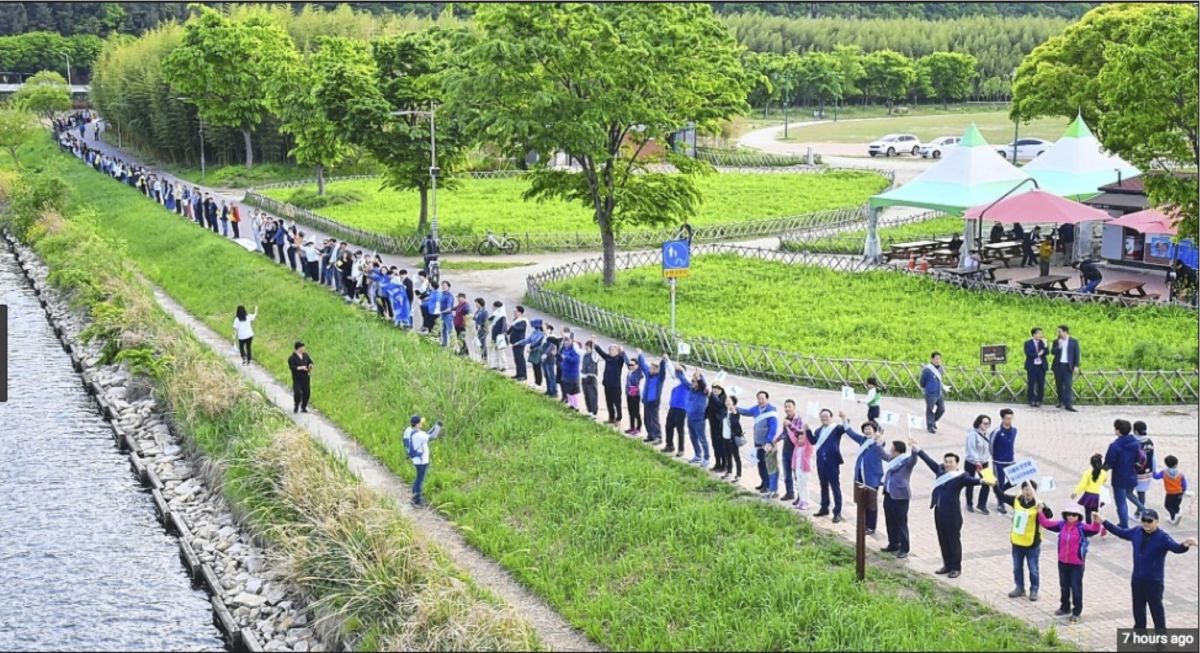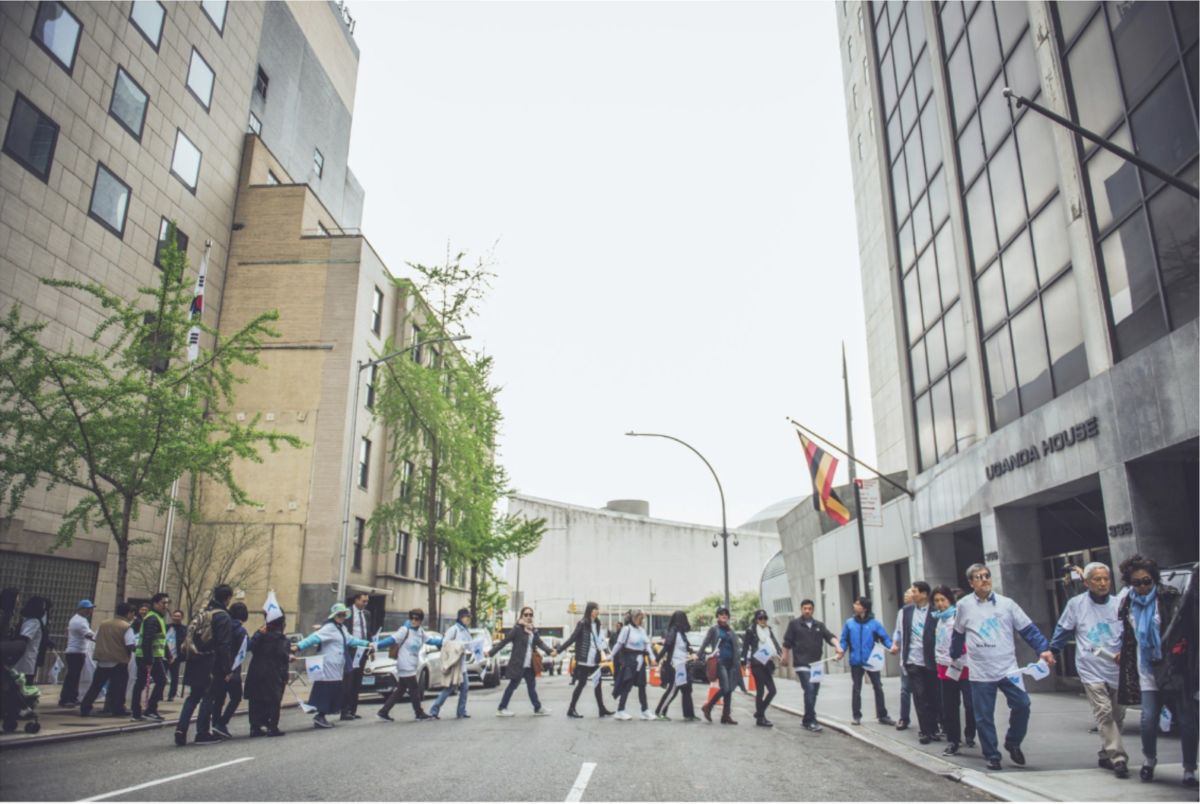On the one-year anniversary of the April 27 Panmunjom Declaration, the landmark inter-Korean agreement in which President Moon and Chairman Kim committed to bringing a formal end to the Korean War, South Korean news networks were peppered with coverage of the hundreds of thousands of South Koreans forming a human chain along the 500-kilometer demilitarized zone (DMZ) established in 1953 as part of the Korean Armistice Agreement.
Originally intended to serve as a temporary buffer zone between the two Koreas until a peace settlement could be reached, the DMZ remains the most heavily fortified border in the word, separating generations of Koreans from one another. The DMZ Peace Chain, as this human chain came to be called, served as a powerful expression of the Korean desire for reconciliation and peace. It gathered worldwide attention, with Pope Francis offering his prayers that “this celebration offer hope to all that a future based on unity, dialogue and fraternal solidarity is indeed possible.”
In the U.S., however, the anniversary of the landmark inter-Korean agreement passed with virtually no attention from the domestic media.
In spite of the fact that over 70 percent of South Koreans believe that the Panmunjom Declaration has had a positive impact on inter-Korean relations, cynicism and overt opposition to the inter-Korean peace process have dominated U.S. media since the groundbreaking meeting between President Moon and Chairman Kim. The U.S. media’s overt tendency to discount Korean sentiment while appraising Korean affairs is a reflection of a longstanding political dynamic in Washington. With almost colonial flair, the U.S. has dominated inter-Korean affairs for nearly a century, to the extent that domestic Korean sentiment is barely treated as an afterthought.
A Korean women’s peace delegation visiting Washington last month reported that the majority of U.S. congressional representatives they met with characterized the summit held in Singapore between Chairman Kim Jong Un and President Donald Trump as “just a show,” diminishing the fact that the state of U.S.-North Korea relations impacts millions of actual people. Many of these Congress members openly cast doubt on the fact that South Koreans overwhelmingly support peace with the North. Lamenting that even “progressives in the U.S. seem unwilling to support the efforts of South Korean President Moon Jae-in,” Rev. Jiseok Jung, one of the organizers of the DMZ Peace Chain, appealed to Americans to “support respectful dialogue with North Korea.”
I had a similar experience during my own visit with Democratic members of Congress on June 12, 2018, as part of the Korea Peace Network, finding myself on the receiving end of some rather blunt comments by an adviser to Sen. Bob Menendez. Commenting on the then-recent Panmunjom summit, he pointed out that irrespective of any current or future South Korean diplomatic initiatives, U.S. self-interest dictated that “the 28,500 American troops stationed in South Korea remain to defend America’s strategic interest in Northeast Asia,” presumably in perpetuity, with Koreans continuing to foot the bill. In this sadly popular version of U.S. realpolitik, the will of the Korean nation is unshakably subordinated to U.S. geopolitical and strategic interests.
Bringing Koreans Together
Pyongyang and Washington have been deadlocked since the Singapore summit, due primarily to Trump’s hardline stance demanding the North’s upfront and total denuclearization, which even conservative analyst Daniel DePetris labels the “same bankrupted formula under [a] delusional theory.” In spite of this impasse, President Moon, who brokered the first meeting between Trump and Kim, is continuing his efforts to salvage diplomacy and to place Koreans at the center of the peace process.
The concept of providing Koreans with something beyond a proxy role in determining their own destiny resonates with many. Philip Zelikow, a former U.S. diplomat who had direct experience in steering the U.S.’s role in German unification and navigating the end of the Cold War, favors the model of “bringing Koreans together first.” Zelikow argues that the key to successful denuclearization lies not in narrowing the focus to the resolution of “technical issues,” but in harnessing the “enormous political force in both of the Koreas” by focusing on “issues that the Korean people care deeply about.”
Zelikow’s stance is shared by 1976 Nobel Peace Laureate Mairead Maguire from Northern Ireland, a veteran of the Irish peace process. In her solidarity message with the DMZ Peace Chain, she invoked the universal principle of self-determination in calling for Koreans to take control of their own destiny. Recalling her visits to both North and South Korea in an interview with Truthout, she lauded “the Korean people’s passion for peace and a peace treaty,” and encouraged Koreans not to “let outsiders destroy your peace.”
“It is your country, make peace happen!” Maguire said.
The Deep Roots of Nonviolent Resistance in Korea
In fact, nonviolent resistance to injustice is a deeply rooted principle within Korean political culture. The DMZ Peace Chain invoked the spirit of the Korea’s 1919 March 1 Movement — a nonviolent nationwide protest calling for Korea’s liberation from Japanese colonial rule, and one of the first civilian-led social movements of the 20th century. It also drew inspiration from more recent nonviolent civil political transformations in Korea, including the 2016-2017 Candlelight Revolution, which brought an end to the rampant corruption of the Park Geun-hye administration. As Boston College Emeritus Professor Ramsay Liem told Truthout, the DMZ Peace Chain “continues the long history of the Korean people’s struggle for independence and justice … Korea’s greatest gift to the world will be the example of the indomitable will of everyday people to chart their own future and make their own justice.”

The more than 500,000 participants represented Koreans of all stripes and political beliefs, from young to old, and from far-right religious groups to the most progressive organizations. Reflecting the global significance of the Korean peace process, citizens of 20 countries were represented among the 30,000 participating non-Koreans who joined in at the DMZ and around the world, as concurrent human chains were formed in Sydney, Okinawa, Berlin, Los Angeles and New York.
In the United States, the Peace Chain was endorsed by renowned intellectuals, peace activists, military veterans and prominent Korean American community leaders, who reiterated the obligation and responsibility of the United States to bring about — or at least not impede — peace in the Korean Peninsula. Their voices are having an impact on the U.S. Congress, as evinced by resolutions such as H.R 1771 – Divided Families Reunification Act and H. R. 152 – Calling for a formal end of the Korean War.
The DMZ Peace Chain stands in magnificent contrast to the Washington-dominated political narrative, in which 80 million Koreans seem to be considered at best incidental to a Korean peace process. Reconciliation and peace between the Korean people, and an end to the genocidal war that scarred their nation, is a gravely historic matter that should be for them to decide. It cannot and must not be reduced to a bargaining chip in the struggle for one-upmanship between U.S. Republicans and Democrats. It is high time that Koreans take their place at the center of the peace process. Let Koreans set themselves free.
Join us in defending the truth before it’s too late
The future of independent journalism is uncertain, and the consequences of losing it are too grave to ignore. To ensure Truthout remains safe, strong, and free, we need to raise $50,000 in the next 9 days. Every dollar raised goes directly toward the costs of producing news you can trust.
Please give what you can — because by supporting us with a tax-deductible donation, you’re not just preserving a source of news, you’re helping to safeguard what’s left of our democracy.
